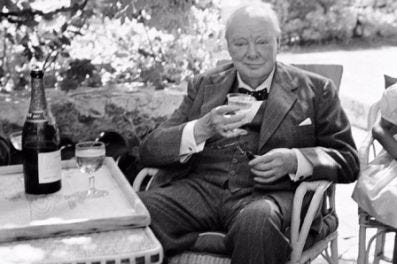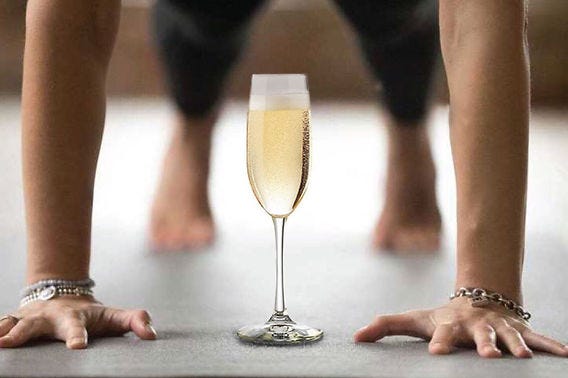TL;DR: There is a lot to love about champagne, but protecting you from cardiac arrest is probably not one of them.
Anyone who knows me knows I love champagne. I used to be a die-hard red wine fan, but let’s just say the bubbles are gentler on my aging body. I also blame my husband, who after moving to the UK, thought we could emulate Winston Churchill, a high achiever who famously drank two bottles of champagne a day.
I could not live without Champagne. In victory I deserve it. In defeat I need it.
Winston Churchill, 1946
But was it Churchill’s champagne habit that helped him live to 90?
A recent headline grabbed the attention of me and my champagne-loving friends (you know who you are 😉).
Source: The Guardian
Much like any headline touting the health benefits of coffee, I allowed myself a moment to wallow in confirmation bias (of course, this must be true!) before putting on my skeptical scientist hat. Sadly, my instincts were right: this news is too good to be true.
The Study
The new study, published in the Canadian Journal of Cardiology, used UK Biobank data on over 500,000 people, tracking about 3,000 cases of sudden cardiac arrest (SCA) over 13 years. So far, so good. The UK Biobank is a high-quality dataset (and happens to be run by colleagues in my department). The UK Biobank is best known for genetic discovery, due to its large genotyped sample. On the downside, it suffers from volunteer bias: participants tend to be healthier, wealthier, more educated, and generally more health-conscious than the average Brit.
The authors took a “hypothesis-free” approach, scanning for associations between 125 different variables and the risk of sudden cardiac arrest. While some might call this a “fishing expedition,” here the authors call it a “data-driven approach that does not rely on previous knowledge.” This approach can be useful in new areas of biological discovery, like genetics, but it’s on less strong footing here with well-known social, environmental, and lifestyle exposures.
The 125 “modifiable risk factors” included everything from nap habits and video game use to “fed-up feelings”(haven’t we all been there), education level, salt usage — and, yes, average weekly champagne plus white wine intake. These variables were reduced to binary "high vs. low" or "yes vs. no" categories. Maybe you are starting to see some of the problems here…
🥂 Champagne Problems
The authors found 56 variables associated with risk of sudden cardiac arrest. Among the supposed protective factors: drinking more champagne, using sunscreen, and “worrying too long after embarrassment.”
Source: Luo, et al (2025). Modifiable Risk Factors and Attributable Burden of Cardiac Arrest: An Exposome-wide and Mendelian Randomization Analysis, Canadian Journal of Cardiology Note: Hazard Ratios (HRs) greater than one are associated with a higher risk, while HRs less than one are associated with lower risk.
Each factor was tested independently —meaning they didn’t account for the fact that many health behaviors cluster together. For example, people who exercise a lot are typically more health-conscious and do many other things they believe to be healthy, like wearing sunscreen and not smoking. They also tend to have higher levels of education and in many cultures—drink more wine. The models didn’t adjust for any of that — only age, sex, and race/ethnicity.
All Sparkle, No Substance
The authors tried to back up their claims with Mendelian Randomization (MR) — a method that uses genetic variants as proxies to estimate causal effects. I’ll save an MR deep dive for another time since its a clever method, when applied correctly. This is not one of those times.
To do MR, you need genetic variants that reliably predict your exposure of interest. So… what are the genes for champagne drinking, you may ask? This is a bit like trying to find genetic predictors of “shopping at Whole Foods” or “listening to jazz.” Any genetic markers identified are likely either statistical noise or proxies for other social rather than biological pathways.
And yet, the authors claim their MR analysis confirms a causal, protective effect of champagne/white wine on sudden cardiac arrest — along with computer use and dried fruit intake.
You can probably tell that I found this part of the paper quite unconvincing.

Bottom Line: Taking Off Our Rosé-Colored Glasses
Overall, the protective effect of bubbly is likely more fizz than fact. Champagne drinkers tend to be wealthier, healthier, and better educated-- not biologically protected by their Extra Brut. This study’s weak design makes it easy for associations to bubble up, but with no real meaning.
And while this may seem like a harmless headline, it’s not all fun and games given the growing recognition of potential health harms associated with even moderate alcohol use. This is an area where we need the strongest possible research designs given the cultural forces shaping alcohol consumption that make it hard to draw clear biological conclusions from any associations.
You guys know it pains me to say it….but this study should have stayed uncorked. I still raise the occasional glass myself, but any health benefits definitely come from the time spent with the people I am sharing it with.
Stay well,
Jenn









Cheers (both meanings)
Sad, but true. Thanks for always helping us navigate the truth between our silly tales.